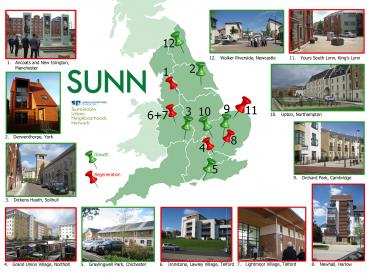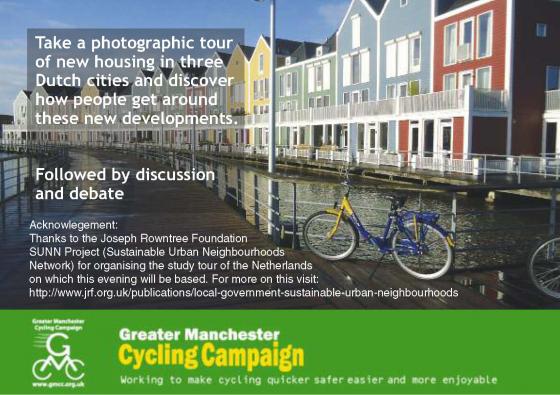SUNN’s regular day-long field meetings involved discussions and a guided walk around the site of the meeting. By the conclusion of 2010 meetings had been held in Cambridge (Orchard Park) 15 March 2010, Solihull (Dickens Heath) 12 April 2010, Newcastle (Walker Riverside) 21 June 2010 and Telford (Ironstone Lawley and Lightmoor) 21 October 2010. Each of these meetings produced a report based on the day’s events and conclusions drawn (downloadable from this blog).
By June 2011 SUNN members had seen and learnt a lot and an interim report was launched to summarise the interim findings, drawing on SUNN’s workshops and field visits (downloadable from this blog). The report outlined 2011 meetings planned in Manchester (Ancoats and New Islington), London (Grand Union Village, Northolt) and a Dutch Study Tour (Vathorst, Houten and Almere).
Some of the lessons learnt from each of the 2010 meetings were as follows:
Orchard Park, Cambridge, a development of one of the first planned urban extensions, on the edge of Cambridge’s main council estates and the route of the guided bus, was threatened by builders withdrawing, leaving it looking like ‘Beirut’ according to a journalist. Thanks to co-operation between South Cambridgeshire District Council and subregional partnership Cambridgeshire Horizons with support from registered social landlords (RSLs), action was taken to rebuild confidence, and a vibrant new community, with an active Parish Council, has emerged. Cambridgeshire Horizons links adjacent local authorities and other key players in promoting local development. This confirms the importance of supporting neighbourhood planning at the local authority and sub-regional levels.

Dickens Heath, Solihull is a new settlement in the Green Belt of a prosperous area where high standards of architecture were demanded and were financially viable. It showed the real value of sustained local authority leadership over the entire development period of a decade and more, and the great benefit of an active Parish Council. If more new housing schemes were of the quality of Dickens Heath there might be much less local opposition. However, the scheme did raise real questions about the costs and benefits of providing more of a social mix, and of achieving similar quality in areas with lower property values. It also demonstrated, even with best of intentions, the difficulty of achieving retail vitality in a new but traditional high street environment at the centre of the development.

Walker Riverside, Newcastle, in the city’s East End is one of a number of community regeneration schemes aimed at rebalancing the local economy and population. Attractive, affordable new housing and new open spaces are changing the area’s image and creating a mixed-income community close to the city centre, thus reducing transport costs and emissions. The revitalisation of their neighbourhood in a participatory framework is also empowering long-standing existing residents dismayed by decline. However, progress has been disrupted by the withdrawal of funding for regeneration, infrastructure improvement and housing association grant, which puts previous investments at risk and undermines a long-term regeneration process.

Ironstone Management Services, Telford is an innovative agreement between Bournville Village Trust, Sanctuary Housing Association, and the Ironstone consortium means that all new residents receive a high level of estate services for a charge of £250 pa. This gives rise to high quality, well-managed public spaces, whatever the tenure and is helping to build a sense of community. Neighbourhood Watch, and TV/radio provision for all, has been put in place from the beginning.









